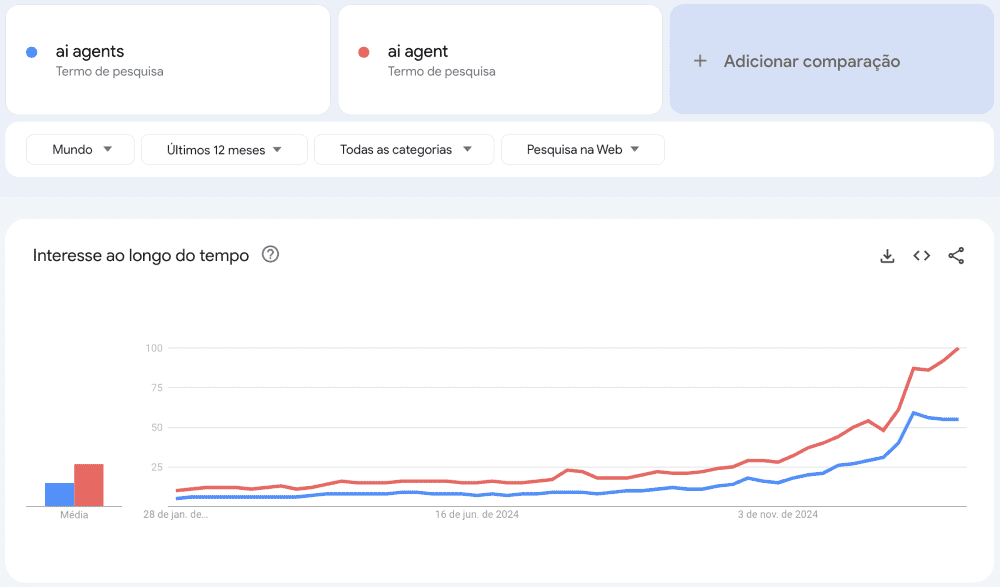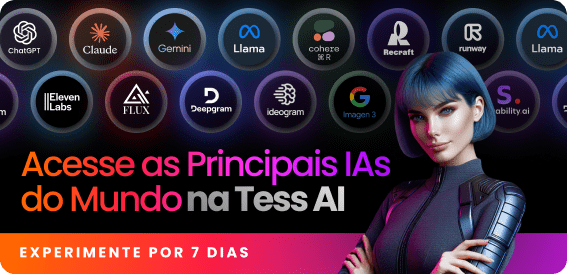The rise of multimodal models and AI Agents is leading the next wave of AI innovation, dramatically expanding its applications to much broader use cases than the initial text-based models achieved (State of the Cloud 2024 - Bessemer Venture Partners, 2024).
In this article, we'll explore the era of AI Agents, their various applications, how they compare to traditional artificial intelligence chats, the main agents in the spotlight and a practical guide on how to create your own agent to optimize your activities.
What Is the Age of AI Agents?
The Age of AI Agents marks a significant evolution in the use of AI, where systems are able to act autonomously, reason and perform complex tasks.
The following is a compilation of recent information about well-known public figures who have shown their enthusiasm for the impact of AI Agents. Check them out!
➡️ Mark Zuckerberg, CEO of Meta, has said that we will live in a world where there will be billions of different AI agents, possibly more than people. He says the focus is on giving every creator and company the ability to create their own AI agents.
➡️ Jensen Huang, founder and CEO of NVIDIA, also emphasized AI agents at CES 2025: "AI has been advancing at an incredible pace. From the beginning with Perception AI, we can understand images, words and sounds; Generative AI, we can generate images, texts and sounds; and now Agentic AI, AIs that can perceive, reason, plan and act."
➡️ While Martin Keen, IBM's Master Inventor, explains that agents can break down complex problems into multi-step plans and can interact with tools and databases to achieve their goals.
This new era promises to transform the way companies operate, offering significant competitive advantages and improving the efficiency of business processes.
What are AI Agents?

As you can see, interest in AI Agents is growing all the time. But what are AI Agents anyway?
AI Agents are advanced AI systems that operate with high autonomy, perceiving the environment, making decisions and carrying out actions independently.
Below, we'll explore its main features:
- Autonomy: they work with minimal human intervention.
- Reactivity: they respond quickly to changes in the environment.
- Proactivity: they initiate actions to achieve goals.
- Continuous Learning: they improve their performance over time.
- Specialization: they can be trained for specific tasks.
- Interoperability: they work together with other systems and agents.
What are AI Multi-Agents?
AI multi-agents are systems made up of several AI models that collaborate to achieve complex goals. They process data in formats such as text, image, video and audio in an integrated and coherent way.
These agents communicate constantly, exchanging information, adjusting strategies and learning from interactions. The continuous exchange of data allows them to perceive and respond quickly to changes in the environment.
This collaborative approach makes multi-agents highly adaptable and applicable in a variety of sectors. They offer comprehensive and innovative solutions, combining individual capabilities for more efficient and accurate results.
AI Agents vs. AI Chats: Understanding the Differences
AI Agents are advanced systems that operate autonomously, making decisions based on data and performing complex tasks. They keep memory between interactions and integrate easily with external tools and APIs.
AI chats are conversational interfaces designed to interact with users via text or voice. They are predominantly reactive and rely on continuous human interaction to make progress on tasks.
While AI Agents automate entire processes and specialize in specific tasks, traditional chatbots have limited integration with external systems and are more generalist, requiring user direction in each interaction.
Practical Applications of AI Agents
To better illustrate how AI Agents work, we've put together three practical examples of their applications. See below how these agents can operate and transform processes in different sectors.
1. E-commerce agent
In online stores, AI Agents can be used to create personalized shopping experiences.
For example, virtual mannequins that use facial recognition to show how different clothes would look on the customer. These agents can also recommend products based on the user's preferences and purchase history.
2. Blog agent:
AI multi-agents are extremely useful in blog management. They can search for relevant articles, generate briefings and optimize SEO.
This improves the blog's visibility in search engines and attracts more readers. In addition, these agents can help with content creation, ensuring that the topics covered are relevant and well-structured.
3. Sales agent:
In the sales sector, AI Agents can transcribe meetings, generate detailed feedback for managers and salespeople, and propose next steps for customers.
They record relevant information in the CRM, making it easier to track and manage customers. These agents improve the efficiency and accuracy of sales operations, providing valuable insights for the team.
The Impact of AI Agents on the Future of Work
As we have seen, the rise of AI Agents in companies is set to have a profound impact. While many fear the replacement of jobs, the reality is more diverse and positive. Here are some of the positive impacts of AI Agents:
Transformation of Roles and Tasks: AI Agents will take over routine tasks, freeing up humans for more creative and strategic work, enabling greater speed and precision.
New Opportunities and Challenges: the demand for training (Upskilling and Reskilling) will grow, helping workers to collaborate with AI Agents. Companies will need to rethink structures and processes to maximize the potential of AI.
Human-AI collaboration: the future of work will be characterized by a symbiosis between humans and AI Agents, complementing each other's strengths.
Discover the 8 Main AI Agents on the Market
Below is a list of the main AI Agents on the market, highlighting their main features. Check them out!
1. tess AI
Tess AI is a no-code multi-agent platform that allows you to create your own AI Agents intuitively, without the need for programming. With over 1 million users worldwide, it offers ease, security and cost-effectiveness.
It uses multiple AI models such as DeepSeek, ChatGPT, Gemini, Claude, Llama, Google Imagen, Flux AI, DALL-E, Stable Diffusion and many others - simultaneously in the same conversation.
The benefit of hiring Tess AI is that it is a platform that centralizes the use of generative AI, eliminating multiple signatures and security concerns.
In addition, Tess AI generates images, texts, videos, audios, avatars and offers AI training, providing everything a company needs to be competitive with Generative AI.
2. AutoGPT
AutoGPT is an open source project that transforms GPT models into autonomous agents, allowing them to perform complex tasks independently.
Using GPT-4, AutoGPT breaks down large objectives into smaller tasks, executing them in sequence to achieve the desired results.
Still in its early stages, AutoGPT is already demonstrating the potential of autonomous agents. Developers are exploiting its capabilities to create advanced applications, from search assistants to automated workflow managers.
3. BabyAGI
BabyAGI is an open source autonomous agent, powered by GPT-4, designed to manage and execute tasks intelligently. It breaks down large objectives into subtasks, prioritizes them and completes them in sequence.
Its modular design allows for customization of workflows and integration with various databases. Adaptable and lightweight, BabyAGI offers essential AI capabilities without demanding too many resources, making it ideal for organizations with limited budgets.
4. Oracle's Miracle Agent
Oracle's Miracle Agent is a set of more than 50 specialized AI Agents for enterprise environments, focusing on database management and business intelligence.
Integrated with Oracle's cloud ecosystem, it automates data processing and visualization with minimal manual intervention.
5. MultiOn's Agent API
MultiOn's Agent API makes it easy to integrate AI Agents into various applications, automating web tasks and improving the user experience. Launched in public beta in April 2024, it allows AI agents to be incorporated for navigation, data extraction and online transactions.
The API supports SDKs in Python and JavaScript, integrating with frameworks such as LangChain and LlamaIndex. Developers use the API to create voice assistants on smart devices and optimize processes on shopping and travel platforms, reducing navigation friction.
6. AgentGPT
AgentGPT is a standalone, open-source AI Agent that allows users to deploy agents directly in the browser. It has been designed to be simple and accessible, allowing the creation and management of agents capable of performing complex tasks with minimal intervention.
What makes AgentGPT unique is its functionality directly in the browser, eliminating the need for extensive configurations or external software. This lowers the barrier to entry for experimentation with AI-driven workflows.
7. Aomni
Aomni transforms B2B sales and research by automating account planning and prospect discovery. It carries out detailed research, identifies Ideal Customer Profiles (ICPs) and generates strategic account plans.
Aomni can train a personalized AI agent with company-specific data, creating precise strategies and saving time. Its lightweight and scalable design allows companies of all sizes to simplify research and improve engagement.
8. Amazon Bedrock Agents
Amazon's Bedrock Agents allow you to create AI solutions without complications. They combine advanced models with easy integration to tools and data, making it easy to create customized workflows.
These agents are flexible for various applications, such as chatbots and process automation. They use your data securely and connect easily to your existing APIs.
Being serverless, Bedrock Agents scale automatically, simplifying the management and execution of business tasks.
9. GPTs (OpenAI)
OpenAI's GPTs (Generative Pre-trained Transformers) are advanced language models that can generate text, answer questions and perform complex conversational tasks.
Their ability to understand and generate natural language effectively makes them widely used in various industries. In addition, GPTs are continually being improved, which extends their capabilities and applications.
How to Create Your Own No-Code AI Agents?
In the world of AI agent creation platforms, many systems still require advanced programming skills. However, the future points to a reality in which any professional can create their own AI agents without the need to program.
This is the Age of No-Code AI Agents, a revolution that democratizes access to and use of AI. To create your own Agents, follow these steps:
- Registration and Configuration: create an account on the no-code platform, such as Tess AI, and access the development environment.
- Defining Objectives: determine the functionalities that your AI agent needs to have, such as answering questions, performing transcriptions or managing data.
- Test and adjust: after building your agent, test it within the platform to check that it is working as expected. Make adjustments and improvements as necessary.
- Launch and integration: when you are happy with your agent, launch it and integrate it into your systems where it will be used.




